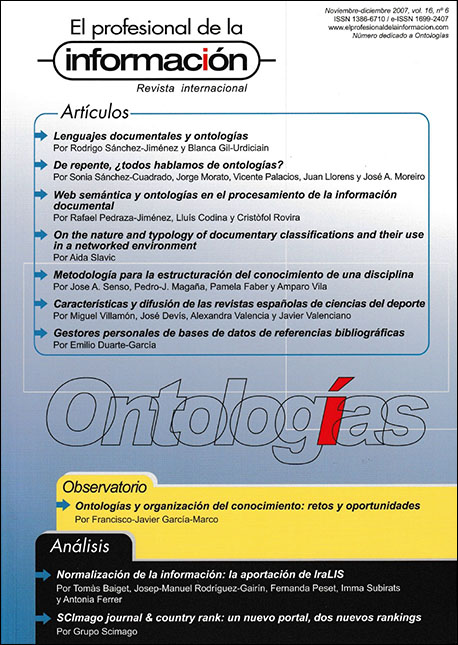On the nature and typology of documentary classifications and their use in a networked environment
DOI:
https://doi.org/10.3145/epi.2007.nov.05Keywords:
Classification schemes, Documentary classifications, Library classifications, TypologyAbstract
Networked orientated standards for vocabulary publishing and exchange and proposals for terminological services and terminology registries will improve sharing and use of all knowledge organization systems in the networked information environment. This means that documentary classifications may also become more applicable for use outside their original domain of application. The paper summarises some characteristics common to documentary classifications and explains some terminological, functional and implementation aspects. The original purpose behind each classification scheme determines the functions that the vocabulary is designed to facilitate. These functions influence the structure, semantics and syntax, scheme coverage and format in which classification data are published and made available. The author suggests that attention should be paid to the differences between documentary classifications as these may determine their suitability for a certain purpose and may impose different requirements with respect to their use online. As we speak, many classifications are being created for knowledge organization and it may be important to promote expertise from the bibliographic domain with respect to building and using classification systems.
Downloads
Downloads
Published
How to Cite
Issue
Section
License
Dissemination conditions of the articles once they are published
Authors can freely disseminate their articles on websites, social networks and repositories
However, the following conditions must be respected:
- Only the editorial version should be made public. Please do not publish preprints, postprints or proofs.
- Along with this copy, a specific mention of the publication in which the text has appeared must be included, also adding a clickable link to the URL: http://www.profesionaldelainformacion.com
- Only the final editorial version should be made public. Please do not publish preprints, postprints or proofs.
- Along with that copy, a specific mention of the publication in which the text has appeared must be included, also adding a clickable link to the URL: http://revista.profesionaldelainformacion.com
Profesional de la información journal offers the articles in open access with a Creative Commons BY license.




